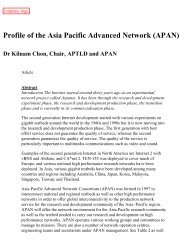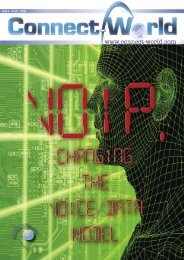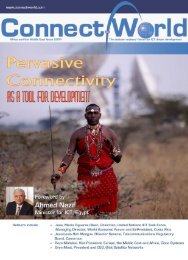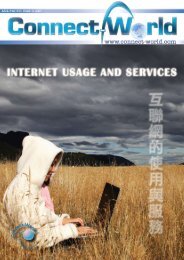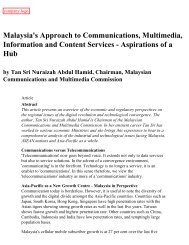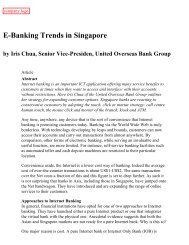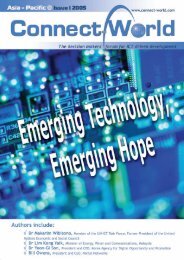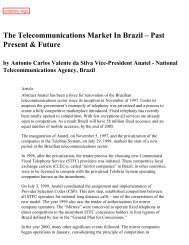Contents - Connect-World
Contents - Connect-World
Contents - Connect-World
You also want an ePaper? Increase the reach of your titles
YUMPU automatically turns print PDFs into web optimized ePapers that Google loves.
Social Development<br />
span, caused by modern medicine,<br />
will bring about a new social demography.<br />
Greater competition will alter the<br />
work-life balance. The world will<br />
shift to a brutal work culture punctuated<br />
by intensive competition, right<br />
sizing and increasingly demanding<br />
professional skill sets. The need to<br />
earn in the prime of a shorter working<br />
life will be immense. This will<br />
conflict with the need to lead a higher<br />
quality of living over a longer life<br />
span and will create enormous physical<br />
and mental pressures. Such<br />
pressures will pave the way for individuals<br />
to seek new sources of emotional<br />
bondage outside the family.<br />
The ubiquity of communications will<br />
forge new communities. The<br />
Internet and satellite television will<br />
vastly expand the global reach of<br />
communities bonded by common<br />
goals and interests. Lastly, the concept<br />
of a nation state will become<br />
obscure, caused by the strengthening<br />
of multilateral trading blocks, greater<br />
migration of professionals across<br />
borders and increasing acceptance of<br />
dual citizenship.<br />
Greater global scrutiny will question<br />
sovereignty, as a right to do whatever<br />
a government likes within its borders.<br />
New global information infrastructures<br />
will emerge in such areas<br />
as meteorology, energy, security,<br />
trade and industry.<br />
Wireless technologies will force their<br />
way into more and more sectors.<br />
Today, wireless is used mainly to<br />
move information. In the future,<br />
wireless will be used to promote collaboration<br />
over a wide range. E-<br />
learning among community groups<br />
in an income and location independent<br />
framework, will become increasingly<br />
important, and will let teachers<br />
and parents collaborate in monitoring<br />
the progress of students.<br />
Wireless will link doctors with<br />
patients in remote regions, and the<br />
remote monitoring of the elderly in<br />
homes, and critical care patients in<br />
hospitals, will reduce the burden<br />
upon both the family and public<br />
facilities. Wireless will deliver government<br />
services to people in remote<br />
areas.<br />
The remote, automatic monitoring of<br />
streets will foster better internal<br />
security and reduce crime. Wireless<br />
communications will link the transportation<br />
systems in the supply chain<br />
and bring reduced costs and more<br />
timely deliveries. Information -<br />
enabled farming and fishing communities,<br />
collaborative robotics in manufacturing,<br />
disaster response and<br />
warfare will all be facilitated by wireless.<br />
Virtual product design and testing,<br />
rapid prototyping for mass customisation<br />
or for specific user group<br />
needs, the transmission of field data<br />
to control systems and control<br />
rooms, remote maintenance of field<br />
equipment, collaborative tele-working<br />
in a location independent framework<br />
and promoting gaming within<br />
communities are all on the list of<br />
activities that wireless will enhance;<br />
the list is virtually endless.<br />
Greater connectivity among citizens,<br />
communities, and companies will be<br />
the sum and effect of all these developments.<br />
The drive to connect will<br />
grow by leaps and bounds. Networks<br />
reform the morphology of societies.<br />
It will go far beyond caste, community,<br />
race and religious connections.<br />
Networks will redefine the landscape<br />
of businesses.<br />
We believe in fostering the development<br />
of a networked world in India<br />
through its next-generation information<br />
and communications network<br />
spanning the length and breadth of<br />
India. This will be based both on<br />
Internet and on wireless technologies.<br />
ICT—Information and Communication<br />
Technology—has made a deep impact<br />
across the length and breadth of<br />
India.<br />
India boasts some of the worlds lowest<br />
entry costs and the worlds lowest<br />
usage charges for any telecommunications<br />
service; ICT is re-defining an<br />
entire industry. Wireless operators<br />
have acquired millions of new customers<br />
this last year. More importantly,<br />
a surge in data applications is<br />
being brought about.<br />
Data services are now generating<br />
countless millions of hits per day,<br />
even surpassing the data usage of<br />
many developed countries. All this<br />
demonstrates the readiness of the<br />
Indian people to use advanced technology,<br />
given the right impetus of<br />
costs, access, and services.<br />
Today, applications development<br />
laboratories are developing several<br />
networking applications on both<br />
wireline and wireless platforms.<br />
Electronic school applications, to<br />
bring parents and teachers together<br />
virtually through the Internet or<br />
using mobile technology, are one<br />
example. A social networking application<br />
to bring common user groups<br />
together on a wireless platform is<br />
another.<br />
Fleet management on a wireless platform<br />
for the transportation community<br />
is one more case in point. For<br />
the ICT sector, the mobile revolution<br />
is only a beginning. The next step,<br />
going beyond the mobile revolution,<br />
is to bring about a broadband revolution.<br />
A networked world is no longer a figment<br />
of imagination. It is steeped in<br />
reality. Concepts such as friendship<br />
flow charts and community cascades<br />
will be in vogue. As networks get bigger,<br />
their value to users will increase<br />
exponentially.<br />
Companies will derive value by<br />
devoting resources to hook into<br />
external networks, understand the<br />
broader changes among constituent<br />
communities, and respond appropriately.<br />
Citizens will derive value in being<br />
part of communities with shared<br />
interests and goals, gaining through<br />
new perspectives, unified articulation<br />
of issues, lower purchase costs,<br />
job referrals and so on. Countries<br />
will derive value by sharing information<br />
infrastructures and harmonising<br />
trading within trading blocks. A networked<br />
world will substantially<br />
improve the efficiency and output of<br />
productive enterprises and social<br />
entities.<br />
India has a unique opportunity to<br />
jump ahead in a networked world.<br />
Fortunately, India is not weighed<br />
down by a legacy of narrow band<br />
access systems. We have already created<br />
an ubiquitous, high capacity,<br />
low cost, information and communication<br />
infrastructure and there are<br />
plans to provide an overarching<br />
broadband access to every home and<br />
every office across India. This will<br />
enable a paradigm shift in communicating,<br />
teaching, learning, treating,<br />
governing, working and shopping.<br />
India has the opportunity to leapfrog<br />
decades of economic lag and social<br />
deprivation. A network revolution<br />
can copiously enhance productivity<br />
and open new avenues for social and<br />
economic growth. It is a vital force in<br />
shaping the future of Indian homes,<br />
offices, governance and public services.<br />
It can powerfully propel India<br />
to global leadership in todays world<br />
of information and knowledge. <br />
8



